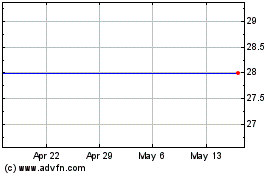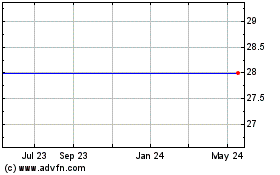Hospitals and Health Systems Prepared to Increase Risk Assumption, Analysis Suggests
June 19 2019 - 6:00AM
Business Wire
Navigant survey conducted by HFMA shows providers planning to
advance commercial and Medicare model, Medicare Advantage, and
provider-sponsored health plan participation
Healthcare providers are ready and planning to assume increased
levels of risk through commercial payer and Medicare contracting
models and Medicare Advantage, according to a new Navigant (NYSE:
NCI) analysis based on a survey conducted by Healthcare Financial
Management Association (HFMA).
According to the survey of 170 hospital and health system senior
finance executives, 72% both believe their organizations have the
capabilities needed to support increased levels of risk and plan to
take on additional risk in the next one to three years across the
following:
- Commercial payer contracting models:
64%
- Medicare value-based models: 57%
- Medicare Advantage: 51%
Survey results also show providers are partnering on or
launching provider-sponsored health plans (PSHPs) as a part of
their risk-assumption strategy. Forty-four percent of respondents
say their organizations are already part of a PSHP (25%) or plan to
launch one in the future (19%).
“The Affordable Care Act left many providers assuming that
risk-based models would be the new normal, but the transition has
not been as successful or widespread as anticipated,” said Richard
Bajner, Navigant managing director and healthcare value
transformation practice leader. “With most health systems
anticipating continued downward pressure on margins, accepting risk
can represent a lever for revenue growth, as long as providers
clarify internal accountabilities and commit enough of their
resources to risk models. These results show the value-based
movement may be coming full circle, and this time providers will
benefit from previous experiences in designing their approach.”
Market trends impacting provider margins include the addition of
approximately 10,000 people to Medicare each day, consumer demand
for a more connected care experience, and declining demand for
inpatient services.
While Medicare and commercial payers are increasing their
value-based contracting offerings, there remains varying levels of
engagement on risk arrangements in local markets, according to
Navigant’s 2018 CEO Forum executive panel.
“Sharing risk must be a collaborative pursuit between payers and
providers,” said Kai Tsai, managing director, Navigant. “It’s clear
that providers are building the capabilities needed to support
enhanced levels of risk and are planning to increase their risk
assumption. Both entities need to partner more closely to lessen
the gap between the supply of and the demand for risk arrangements
in markets nationwide.”
Having the appropriate technology underpinning is essential to
payer-provider risk arrangements. When asked in what areas they’re
planning to increase investments (financial, labor) to enhance
collaboration with payers and support increasing levels of risk,
62% of respondents suggested technological capabilities with more
than half citing physician (57%) and member (56%) engagement.
Among executives suggesting their organizations will not pursue
increased risk levels, 56% cited a lack of local market demand. In
addition, 42% of executives suggested operational processes, such
as contract execution and care coordination and management, as the
top challenge with maintaining risk-based capabilities.
Even with their increased risk-assumption interest, providers
will inevitably continue to operate in a market primarily driven by
fee-for-service (FFS) payments. But the path forward does not have
to be an either-or scenario. Hospitals and health systems can drive
revenue and margin growth in both FFS and value-based worlds
through strategies focused on engaging physicians on clinical
standardization, targeted cost of care reductions in areas such as
post-acute care, and building tight provider network relationships,
the analysis suggests.
View full survey results at www.navigant.com/RiskReadiness.
Navigant’s Healthcare segment is comprised of consultants,
former provider administrators, clinicians, and other experts with
decades of strategy, operational/clinical consulting, managed
services, revenue cycle management, and outsourcing experience.
Professionals collaborate with hospitals and health systems,
physician enterprises, payers, government, and life sciences
entities, providing performance improvement and business process
management solutions that help them meet quality and financial
goals.
About Navigant
Navigant Consulting, Inc. (NYSE: NCI) is a specialized, global
professional services firm that helps clients take control of their
future. Navigant’s professionals apply deep industry knowledge,
substantive technical expertise, and an enterprising approach to
help clients build, manage, and/or protect their business
interests. With a focus on markets and clients facing
transformational change and significant regulatory or legal
pressures, the firm primarily serves clients in the healthcare,
energy, and financial services industries. Across a range of
advisory, consulting, outsourcing, and technology/analytics
services, Navigant’s practitioners bring sharp insight that
pinpoints opportunities and delivers powerful results. More
information about Navigant can be found at navigant.com.
View source
version on businesswire.com: https://www.businesswire.com/news/home/20190619005067/en/
Kyle BlandNavigant Investor
Relations312.573.5624kyle.bland@navigant.com
Alven WeilNavigant704.995.5607alven.weil@navigant.com
Navigant Consulting (NYSE:NCI)
Historical Stock Chart
From Oct 2024 to Nov 2024

Navigant Consulting (NYSE:NCI)
Historical Stock Chart
From Nov 2023 to Nov 2024
